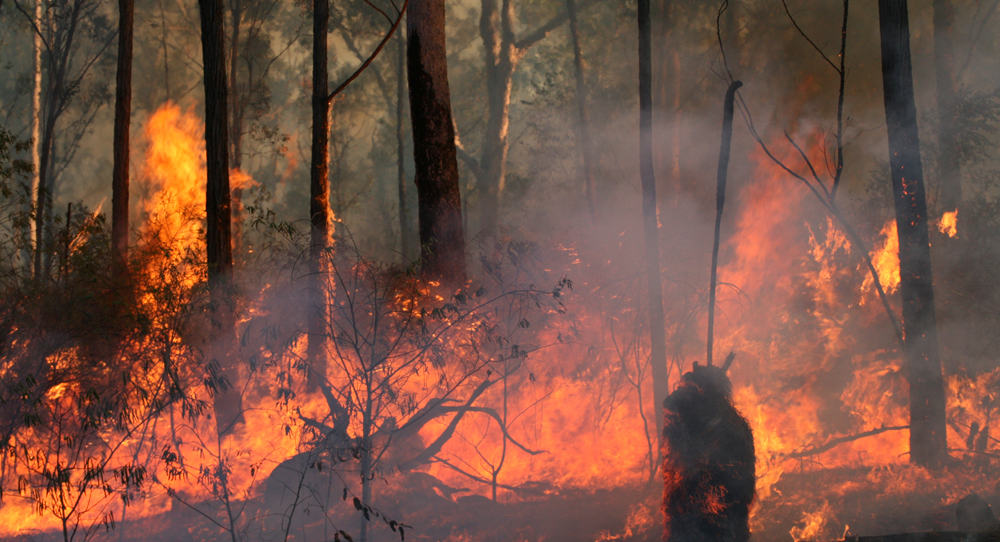A total fire ban is in place, water dropping aircraft are on standby and crews are at the ready as Ipswich firefighters prepare for their first big test of the 2019 fire season.
Thursday and Friday are expected to bring conditions ideal for fires with dry westerly winds, low humidity and temperatures five to six degrees above average forecast.
Queensland Rural Fire Service regional manager Superintendent Alan Gillespie said conditions across the region were so dry firefighters had been forced to rethink their approach.
“The low humidity takes all the moisture out of the ground and the high winds will drive any fire forward,” he said.
“As we know, it was dry last year but this year is even worse. We’re breaking all sorts of records in terms of how little moisture there is in the soil.
“The drought index at Amberley is sitting at 151 and this time of year it’s usually around 100.
“The big thing is a lack of water in the ground, and the fact that a lot of creeks and dams have dried up, which means we need to reconsider our tactics.
“Usually we would bring in water bombing helicopters to help fight fires and they would suck up water from local dams, but because local dams are mostly dry we’ll instead have to call in fixed wing aircraft.
“We’ve got fixed wing aircraft on standby at Boonah and Archerfield. We’ll also make use of things like earthmoving equipment and bring in additional water tankers for support if needed.”

Image courtesy: QFES
Don’t risk causing a fire
Mr Gillespie urged the community to take the total fire ban seriously and do all they can do to reduce the risk of starting a fire.
“The total fire ban in place means you can’t have a fire out in the open and doing so risks stiff penalties including a jail sentence,” he said.
“Beyond that, one of the most common ways fires start this time of year is people working outdoors with welders, mowers, slashers and the like.
“Last year one of our biggest fires happened on the 19th of July at the Sporting Shooters Association at South Ripley and it was started by a mower.
“It doesn’t take much, a rock flicks up and hits the blades causing a spark and then suddenly you’ve got a fire.
“People need to make sure if they are working outside that they have a way to quickly extinguish a fire if one begins.”

Image courtesy: QFES
Be aware, be prepared
Despite Ipswich’s urban landscape growing at a rapid rate, there are still many parts of the city where the threat of grassfire are very real.
Mr Gillespie said anyone who lived in the city’s rural suburbs or near a park or nature reserve should take a good look at their bushfire preparedness.
“A lot of people think because they live in suburbia their place is safe but if you have a park or reserve near your house, the threat of grassfire is very real,” he said.
“People need to keep informed, have an evacuation plan and make sure they know how they would get out.
“A lot of people in the area with hobby farms in particular might think about the cat and the dog, and they can bring them inside, but what are you going to do with the horses or llamas?”
The fire ban in Ipswich will remain in place until 11.59pm on Sunday, unless otherwise updated.
A quick way to begin assessing your bushfire risk can be found here.
What you can do to be prepared
Around the home
- Clear leaves, twigs, bark and other debris from the roof and gutters.
- Purchase and test the effectiveness of gutter plugs.
- Enclose open areas under decks and floors.
- Install fine steel wire mesh screens on all windows, doors, vents and weep holes.
- Point LPG cylinder relief valves away from the house.
- Conduct maintenance checks on pumps, generators and water systems.
- Seal all gaps in external roof and wall cladding.
- Relocate flammable items away from your home, including woodpiles, paper, boxes, crates, hanging baskets and garden furniture.
Make it easy for emergency services
- Display a prominent house or lot number, in case it is required in an emergency.
- Ensure there is adequate access to your property for fire trucks – four metres wide by four metres high, with a turn-around area.
In the garden
- Reduce vegetation loads along the access path.
- Mow your grass regularly.
- Remove excess ground fuels and combustible material (long dry grass, dead leaves and branches).
- Trim low-lying branches two metres from the ground surrounding your home.
Take care of yourself
- Check that you have sufficient personal protective clothing and equipment.
- Check the first aid kit is fully stocked.
- Make sure you have appropriate insurance for your home and vehicles.
- Have a bushfire survival plan.


